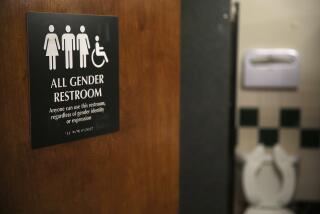PERSPECTIVE ON THE SEXES : Has Time Stood Still for Women? : A new generation is waking in the cycle of amnesia/consciousness, to fight for equality or retreat to self-help.
- Share via
Anyone who is past the age of 38 may be forgiven for feeling like Rip Van Winkle these days. Lately, when I read the paper I have the feeling that I’ve been asleep for 20 years; the news is sounding like re-runs of headlines from the 1970s (except that the intervening generation doesn’t know who Rip Van Winkle is). Some cases in point:
-- Dozens of studies find that teachers pay more attention to boys in class, reward girls’ dependency and discourage girls from thinking about careers in math and science; schools depress girls’ self-esteem and channel them into sex-stereotyped occupations. Is this the American Assn. of University Women report that made headlines last week? No, it’s a summary of research conducted and reported in the early 1970s.
-- Studies of rape victims, attitudes toward rape and jury decisions in rape cases indicate that about the only time the public looks sympathetically on a woman who presses charges is if she is “innocent”--young, virginal (if not an actual virgin), naive and, ideally, had been sleeping in her bed, fully clothed, when the attack occurred. Is this an explanation for explain why Mike Tyson’s accuser was believed but William Kennedy Smith’s was not? No, these were studies done in the early 1970s.
-- The news is full of reports of widespread harassment that women endure at work: male co-workers urinating into the women’s lockers, putting used condoms in the women’s handbags, demanding sexual favors as a condition of employment. A rash of accusations following Anita Hill’s charges against Clarence Thomas? No, stories reported in the mid-’70s.
Of course, when I wake up I realize that tremendous progress has been made in law, education and the workplace. It’s no longer news, as it was in the ‘70s, that a woman is the first female something: first female miner (1973), first female food vendor in a New York stadium (1977), first female astronaut (1977), first female rabbi (1972), first female tennis player to get equal prize money at the U.S. Open (1973). Now it’s news that women, with a toe in the door, want to put a whole foot in. We don’t hear much anymore about lawsuits on behalf of women who wanted to be first; now we get stories of lawsuits on behalf of women who want to be promoted. Janella Sue Martin just won her suit against Texaco for failing to promote her over less competent men, but, just as we did back then, we may reasonably ask why such a suit was necessary.
The history of the women’s movement in America follows a consciousness/amnesia cycle. First there is a burst of awareness of pervasive injustice and a flurry of fury. Organizations emerge to work for certain causes, such as the vote, birth control, the equal rights amendment or abortion rights. Then the forces of reaction mobilize to block all changes they regard as dangerous and immoral. After strenuous debate and a few steps forward, there is an exhausted lull, during which the next generation concludes that the problem has been settled, the issue won. Then, of course the next generation discovers its own crises and issues and the cycle starts up again.
Today a new awareness of persistent inequities is on the rise, along with anger that women are still not being listened to, that they are far from equal in the workplace and that too many suffer from contempt and violence at the hands of men. I welcome this renewed emotion and energy, but if women and men don’t learn from the history of the consciousness/amnesia pattern they will be condemned to repeat it.
The first step is to recognize the many attractions that the amnesia phase holds for women. It does not occur only because political and social institutions place obstacles in the path to equality, although they do. It occurs because women get much more sympathy and support when they define their problems in medical or psychological terms than in political terms. It occurs because women feel stronger when they try to solve all their family and job conflicts by themselves; most people want to see themselves as active agents of their own destiny rather than as victims of social arrangements. It occurs because it is tiring to fight the same battle, over and over, in private relations and public issues. “We have been trying to educate and agitate around women’s liberation for several years,” the poet Marge Piercy wrote in the early 1970s. “How come things are getting worse?” When change proves to take longer than “several years,” it is a relief to pass the baton to the next generation and turn to the consolations for the exhausted self.
In every amnesia phase, women find solace in the many personal “cures” for their anger and unhappiness: Find your inner child. Find who you were in a past life. Find a new husband. Look backward to your childhood. Look inward to your feelings. I have every sympathy for those who would retreat from the fray and seek “personal growth,” as long as no one forgets that while these methods may temporarily soothe, they are not enough. They won’t end sexism in the classroom, eliminate violence and hostility toward women, or win day-care and better wages in the workplace. Amnesia is comforting--until the real world wakes us up.
More to Read
Sign up for Essential California
The most important California stories and recommendations in your inbox every morning.
You may occasionally receive promotional content from the Los Angeles Times.













